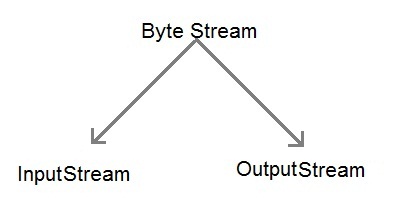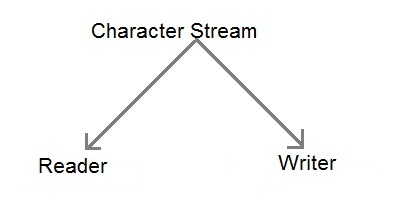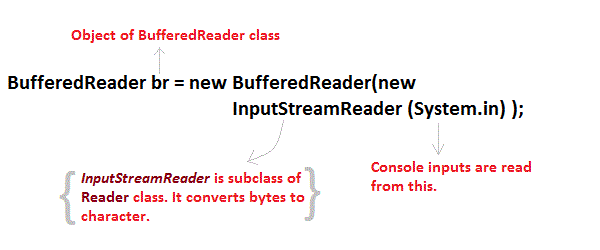Java performs I/O through
Streams. A Stream is linked to a
physical layer by java I/O system to make input and output operation in
java. In general, a stream means continuous flow of data. Streams are
clean way to deal with input/output without having every part of your
code understand the physical.
Java encapsulates Stream under
java.io package. Java defines two types of streams. They are,
- Byte Stream : It provides a convenient means for handling input and output of byte.
- Character Stream : It provides a convenient means for
handling input and output of characters. Character stream uses Unicode
and therefore can be internationalized.
Byte Stream Classes
Byte stream is defined by using two abstract class at the top of hierarchy, they are InputStream and OutputStream.
These two abstract classes have several concrete classes that handle various devices such as disk files, network connection etc.
Some important Byte stream classes.
| Stream class | Description |
|---|
| BufferedInputStream | Used for Buffered Input Stream. |
| BufferedOutputStream | Used for Buffered Output Stream. |
| DataInputStream | Contains method for reading java standard datatype |
| DataOutputStream | An output stream that contain method for writing java standard data type |
| FileInputStream | Input stream that reads from a file |
| FileOutputStream | Output stream that write to a file. |
| InputStream | Abstract class that describe stream input. |
| OutputStream | Abstract class that describe stream output. |
| PrintStream | Output Stream that contain print() and println() method |
These classes define several key methods. Two most important are
read() : reads byte of data.write() : Writes byte of data.
Character Stream Classes
Character stream is also defined by using two abstract class at the top of hierarchy, they are Reader and Writer.
These two abstract classes have several concrete classes that handle unicode character.
Some important Charcter stream classes.
| Stream class | Description |
|---|
| BufferedReader | Handles buffered input stream. |
| BufferedWriter | Handles buffered output stream. |
| FileReader | Input stream that reads from file. |
| FileWriter | Output stream that writes to file. |
| InputStreamReader | Input stream that translate byte to character |
| OutputStreamReader | Output stream that translate character to byte. |
| PrintWriter | Output Stream that contain print() and println() method. |
| Reader | Abstract class that define character stream input |
| Writer | Abstract class that define character stream output |
Reading Console Input
We use the object of BufferedReader class to take inputs from the keyboard.
Reading Characters
read() method is used with BufferedReader object to read
characters. As this function returns integer type value has we need to
use typecasting to convert it into
char type.
int read() throws IOException
Below is a simple example explaining character input.
class CharRead
{
public static void main( String args[])
{
BufferedReader br = new Bufferedreader(new InputstreamReader(System.in));
char c = (char)br.read();
}
}
Reading Strings
To read string we have to use
readLine() function with BufferedReader class's object.
String readLine() throws IOException
Program to take String input from Keyboard in Java
import java.io.*;
class MyInput
{
public static void main(String[] args)
{
String text;
InputStreamReader isr = new InputStreamReader(System.in);
BufferedReader br = new BufferedReader(isr);
text = br.readLine();
System.out.println(text);
}
}
Program to read from a file using BufferedReader class
import java. Io *;
class ReadTest
{
public static void main(String[] args)
{
try
{
File fl = new File("d:/myfile.txt");
BufferedReader br = new BufferedReader(new FileReader(fl)) ;
String str;
while ((str=br.readLine())!=null)
{
System.out.println(str);
}
br.close();
fl.close();
}
catch (IOException e)
{ e.printStackTrace(); }
}
}
Program to write to a File using FileWriter class
import java. Io *;
class WriteTest
{
public static void main(String[] args)
{
try
{
File fl = new File("d:/myfile.txt");
String str="Write this string to my file";
FileWriter fw = new FileWriter(fl) ;
fw.write(str);
fw.close();
fl.close();
}
catch (IOException e)
{ e.printStackTrace(); }
}
}
 These two abstract classes have several concrete classes that handle various devices such as disk files, network connection etc.
These two abstract classes have several concrete classes that handle various devices such as disk files, network connection etc. These two abstract classes have several concrete classes that handle unicode character.
These two abstract classes have several concrete classes that handle unicode character.


